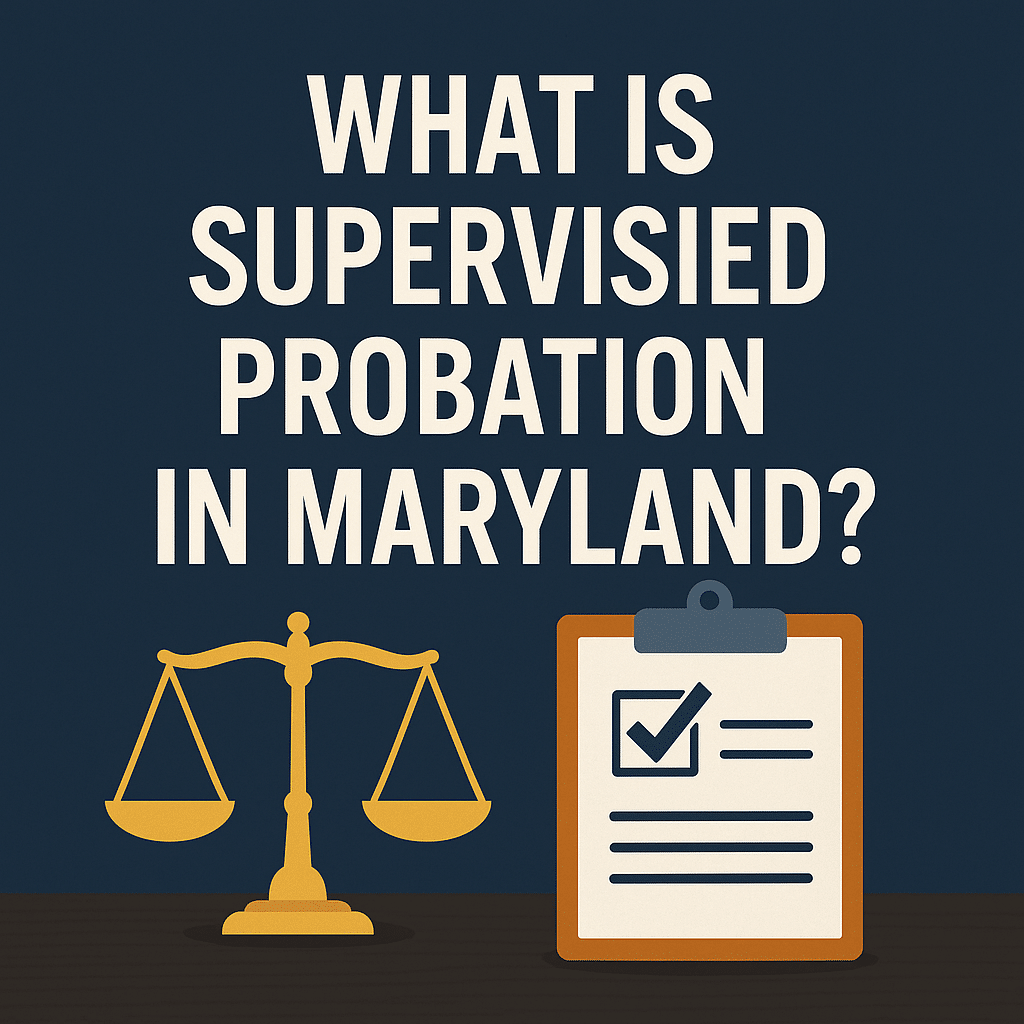
Supervised probation in Maryland is a court-ordered sentence that allows a person convicted of a crime to remain in the community instead of serving time in jail. However, that freedom comes with strict oversight by a probation officer from the Maryland Division of Parole and Probation. The individual must report regularly, follow court-ordered conditions, and demonstrate that they are living responsibly and lawfully.
Supervised probation differs from unsupervised probation because it involves active monitoring by a probation officer. Failure to comply with any of the conditions can result in a violation of probation and possible jail time.
Common Questions About Supervised Probation in Maryland
When people search for information about supervised probation, they often ask questions such as:
- What are the conditions of supervised probation?
- How long does supervised probation last in Maryland?
- What happens if you violate probation?
- How does supervised probation differ from unsupervised probation?
- Are there any fees or costs for supervision?
Each of these questions is answered below.
Conditions of Supervised Probation
If you’re sentenced to supervised probation, you must follow a list of standard and sometimes special conditions set by the court. Common requirements include:
- Regular reporting: You must meet with your probation officer regularly—usually once a month, but possibly more often early in your supervision.
- Obey all laws: Any new arrest or conviction can be considered a violation.
- Drug and alcohol testing: Many people are required to submit to random urinalysis or breath tests.
- Employment or education: You may need to keep a job, attend school, or participate in job training.
- Community service and restitution: Courts can order you to perform community service or repay victims.
- Counseling and treatment: Substance abuse or anger management programs may be mandatory.
- Travel restrictions: You can’t leave the state—and sometimes the county—without written permission from your probation officer.
- Home and work visits: Officers may show up unannounced to ensure compliance.
A judge can also impose special conditions tailored to your case, such as no contact with certain individuals, mental health treatment, or electronic monitoring.
How Long Does Supervised Probation Last?
In Maryland, the length of supervised probation depends on the court:
- District Court: Up to three years
- Circuit Court: Up to five years
In certain situations—especially when restitution is owed—the court can extend probation beyond those limits to ensure payments are made. Judges also have the authority to modify or terminate probation early if you have fully complied with your conditions.
What Happens If You Violate Supervised Probation?
If your probation officer believes you violated the terms of supervision, they may file a Violation of Probation (VOP) report with the court. You’ll then be scheduled for a VOP hearing, where a judge will decide whether a violation occurred and what the consequences should be.
Possible outcomes include:
- A warning or modification of conditions
- Extension of probation
- Additional treatment or community service requirements
- Jail time if probation is revoked
Maryland law distinguishes between technical violations (like missing an appointment) and new offense violations (being charged with a new crime). Technical violations are less serious, but repeated infractions can still lead to incarceration.
Supervised vs. Unsupervised Probation
| Feature | Supervised Probation | Unsupervised Probation |
|---|---|---|
| Monitoring | Regular reporting to a probation officer | No officer supervision |
| Requirements | Frequent check-ins, drug testing, home visits | Basic conditions, no testing |
| Common Cases | More serious or repeat offenses | First-time or low-level cases |
| Risk of Violation | Higher—officer oversight makes violations more visible | Lower—but violations still possible |
Unsupervised probation typically applies to minor offenses, where the judge trusts the individual to comply with conditions without regular oversight.
Fees, Testing, and Costs
Until recently, people on supervised probation in Maryland were charged a monthly supervision fee and sometimes had to pay for drug testing. However, those fees have largely been eliminated under current Maryland law. You may still be responsible for fines, court costs, or restitution, depending on your sentence.
Tips for Success on Supervised Probation
- Stay organized: Keep a calendar of appointments and deadlines.
- Communicate: Notify your probation officer promptly about address or job changes.
- Stay compliant: Attend all required classes, treatment, or community service sessions.
- Keep records: Save proof of program attendance, payments, and completed requirements.
- Avoid new charges: Even minor citations can create major problems.
Conclusion
Supervised probation in Maryland allows individuals to serve their sentence within the community while being closely monitored by a probation officer. It offers a second chance to rebuild your life outside of jail, but it comes with strict rules and responsibilities. Violations can result in serious consequences—including jail time—so staying compliant is critical.
If you or a loved one is on supervised probation in Prince George’s, Charles, Calvert, or St. Mary’s Counties, an experienced criminal defense attorney can help you understand your rights, communicate with your probation officer, and defend against alleged violations.
Facing probation issues in Southern Maryland? SoMD Criminal Defense handles probation violations and post-conviction matters in Waldorf, La Plata, Calvert County, St. Mary’s County, and Prince George’s County.
